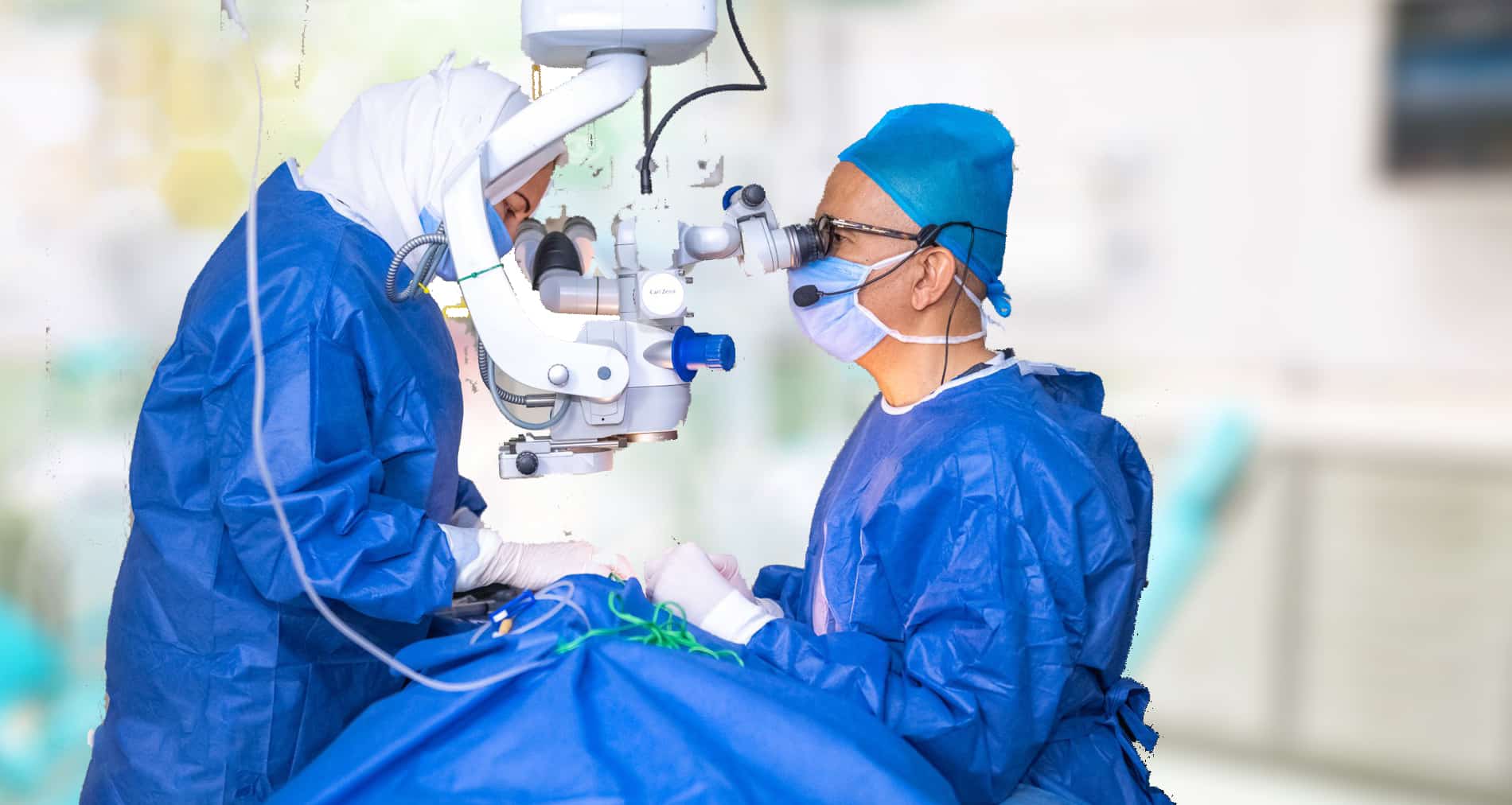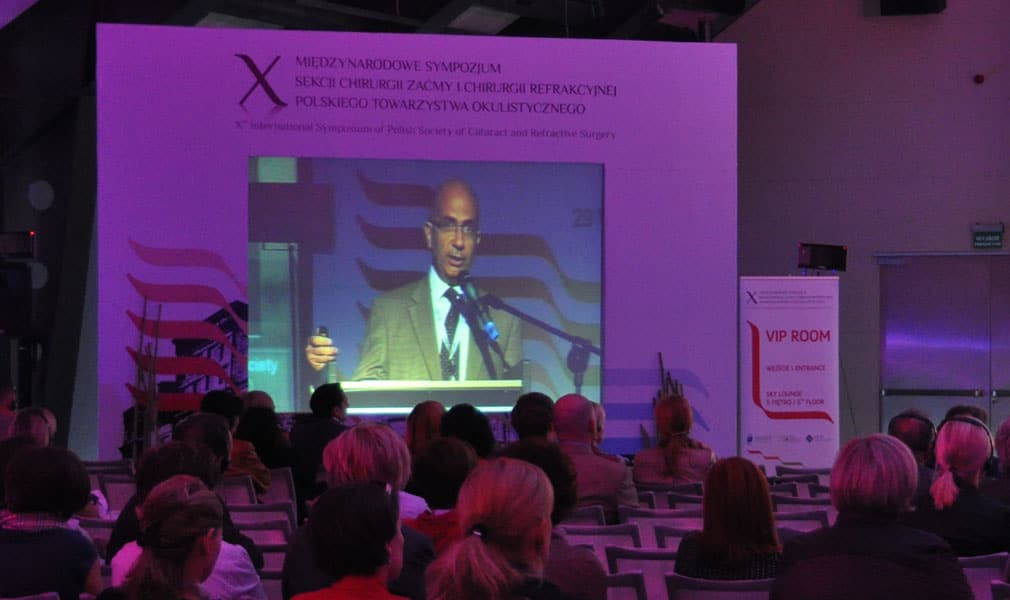Cataract Surgery in Cairo
Cataract Surgery at Dr Khalil Eye Clinic in Cairo, Egypt

If your eyesight has worsened due to cataracts, modern cataract surgery can help you regain clearer vision, and you should experience a quick recovery with minimal impact on your daily life. D Khalil performs cataract surgeries on an outpatient basis.
The Cataract Surgeon, Prof Dr Ahmad Khalil
Among the leading best cataract surgeons in Cairo, Egypt, Dr Ahmad Khalil is accessing all the cutting edge developments in modern cataract surgery, coupled with continuous knowledge updates in the best known big international conferences concerned with cataract surgery around the globe (here shown during a Live Surgery transmission during a World Ophthalmology Congress).

Schedule Your Cataract Surgery
Schedule a consultation for cataract surgery today. Dr Khalil will professionally guide you through the process and ensure your comfort and safety every step of the way.

Modern advances in cataract surgery and its skills, have led to an incredible improvement in the outcomes of cataract operations. With innovative technologies, cutting-edge methodologies, and the finest expertise of Dr Ahmad Khalil, patients now have access to a superior level of care that goes beyond expectations.

With the recent advancements in intraocular lens options for modern cataract surgery, including multifocal, trifocal, extended depth of focus (EDOFs) lenses, and toric lenses, patients can confidently expect significant improvements in their vision correction needs, including presbyopia, myopia, hyperopia, and astigmatism. These remarkable developments in cataract surgery assure enhanced patient outcomes and superior visual quality. Many of Dr. Khalil’s patients in Cairo, Egypt, experience the remarkable advantage of not needing reading glasses post-surgery. This incredible shift has rightfully earned the term REFRACTIVE in the realm of modern cataract surgery, underlining the commitment to achieving outstanding vision with minimal dependence on eyewear.
For your cataract surgery at Dr Khalil Eye Clinic
You will have a full consultation with Dr. Khalil before your cataract surgery, where we will discuss the best options for you.
After the consultation and some tests by Dr. Ahmed Khalil, he will schedule your cataract surgery at a top-notch outpatient center. A skilled anesthesiologist will manage anesthesia, and your internist will need to provide medical clearance. Most patients spend a few hours at the center, but the surgery itself usually takes under 10 minutes.
Pre-Surgery Advisory
Essential Insights Before Your Cataract Surgery
Being well-prepared for your cataract surgery is crucial for achieving optimal results. At Dr. Khalil Eye Clinic, our mission is to empower you with knowledge and support throughout this journey. Here’s a comprehensive guide to help you prepare for your surgery:
- Schedule Your Pre-Operative Consultation – Get tailored advice and clarity on procedures from Dr. Khalil.
- Arrange Transportation for After Surgery – It’s vital to have a driver, as your eyesight may be impaired right after the procedure.
- Avoid Specific Medications as Instructed – Refrain from blood thinners and other drugs as Dr. Khalil advises.
When is time for cataract surgery?
You and Dr Khalil need to work together. If your cataract is getting worse quickly, don’t delay cataract surgery. However, if your vision is still good, you might not need surgery right away. Keep visiting Dr Khalil regularly. Remember, some cataracts may never need to be removed.
The right time for surgery varies for each person. Consider how cataracts affect your life. If they aren’t too bothersome, you can wait a bit longer for surgery. Think about surgery when cataracts become serious enough to disrupt your vision. If cataracts significantly impact your daily activities, you should plan for surgery as soon as you can.
In some situations, a cataract should be taken out even if it doesn’t greatly affect your vision but is impacting diabetic retinopathy, retinal detachment, or other eye issues. If you have cataracts in both eyes, you will need two separate surgeries.
Explore Our Eye Care Solutions
Discover the range of advanced services Dr Khalil offers for optimal eye health

Cataract Surgery
State-of-the-art procedures to restore clear vision, allowing you to enjoy the world around you again.

Glaucoma Management
Comprehensive monitoring and treatment options to maintain your vision and eye health.

Vision Correction
Cutting-edge LASIK and ICL procedures designed to help you achieve the best possible vision.
What can I expect if I decide to have an operation for cataract?
What happens Before cataract surgery?
To find out if your cataract needs to be removed, Dr Khalil will give your eyes a complete checkup. Before surgery, your eye will be measured to find the right power for the lens to be put in. Ask Dr Khalil if you should keep taking your regular medications before the surgery. Please arrange for someone to drive you home after the surgery.
What happens on the day of cataract surgery?
Dr Khalil will do your cataract surgery on an outpatient basis, in an outpatient surgical centre, usually in the morning. You will be asked to skip breakfast. When you arrive for surgery, eye drops will be instilled in your eye, and a mild sedative will be given to help you relax and not feel any discomfort, even that that might be caused by the local anesthesia.
What type of anesthesia Dr Khalil uses for cataract surgery?
A local anesthetic will numb your eye and you may be given a small injection to help you feel comfortable during surgery.
What are the steps of surgery afterwards?
The skin around your eye will be thoroughly cleansed, and sterile coverings will be placed around your head. Your eye will be kept open by an eyelid speculum. You may see light and movement, but you will not be able to see the surgery while it is happening. Under an operating microscope, Dr Khalil will make a small incision in the eye. Tiny surgical instruments are used to break apart and remove the cloudy lens from the eye. The back membrane of the lens (called the posterior capsule) is left in place.
A plastic, acrylic intraocular lens is implanted in the eye to replace the natural lens that was removed.
After surgery is completed, Dr Khalil will place a shield over your eye. After a short stay in the outpatient recovery area, you will be ready to go home.
What should I do after the surgery?
Patients are advised to:
• Administer the eye drops as directed
• Refrain from rubbing or applying pressure to the eye
• Avoid engaging in strenuous activities until cleared by Dr. Khalil
• Consult with Dr. Khalil regarding the timeline for resuming driving
• Utilize eyeglasses or an eye shield as recommended by Dr. Khalil. Most normal daily activities may continue, and over-the-counter pain relievers can be taken if required.
Can cataract surgery combined with other surgeries?
Yes, when the need arises, cataract operations can be combined with other surgeries like glaucoma surgery, intravitreal injections, keratoplasty and others. This is done usually to obtain the best results, and to reduce the burdens of having to undrego several consecutive surgeries.
How about anesthesia for cataract surgery?
Topical or local anesthesia is the norm in the vast majority of the cases.
Are there risks for Cataract Surgery?
As you know, all surgeries carry some risk. With respect to cataract operations, there is always a possibility that a complication might arise during or after surgery. We always explain these risks before you decide to have surgery.
How long will it take to recover from cataract surgery?
You may see clearly on the very first day after surgery. Most patients agree that vision returns quickly, although the exact timing varies from individual to individual. For some patients, experiencing blurred vision for about a week is normal. Most patients resume routine activity within 24 hours.
Messages from patients of Dr Khalil Eye Clinic















Schedule Your Cataract Surgery
Schedule a consultation for cataract surgery today. Dr Khalil will professionally guide you through the process and ensure your comfort and safety every step of the way.














